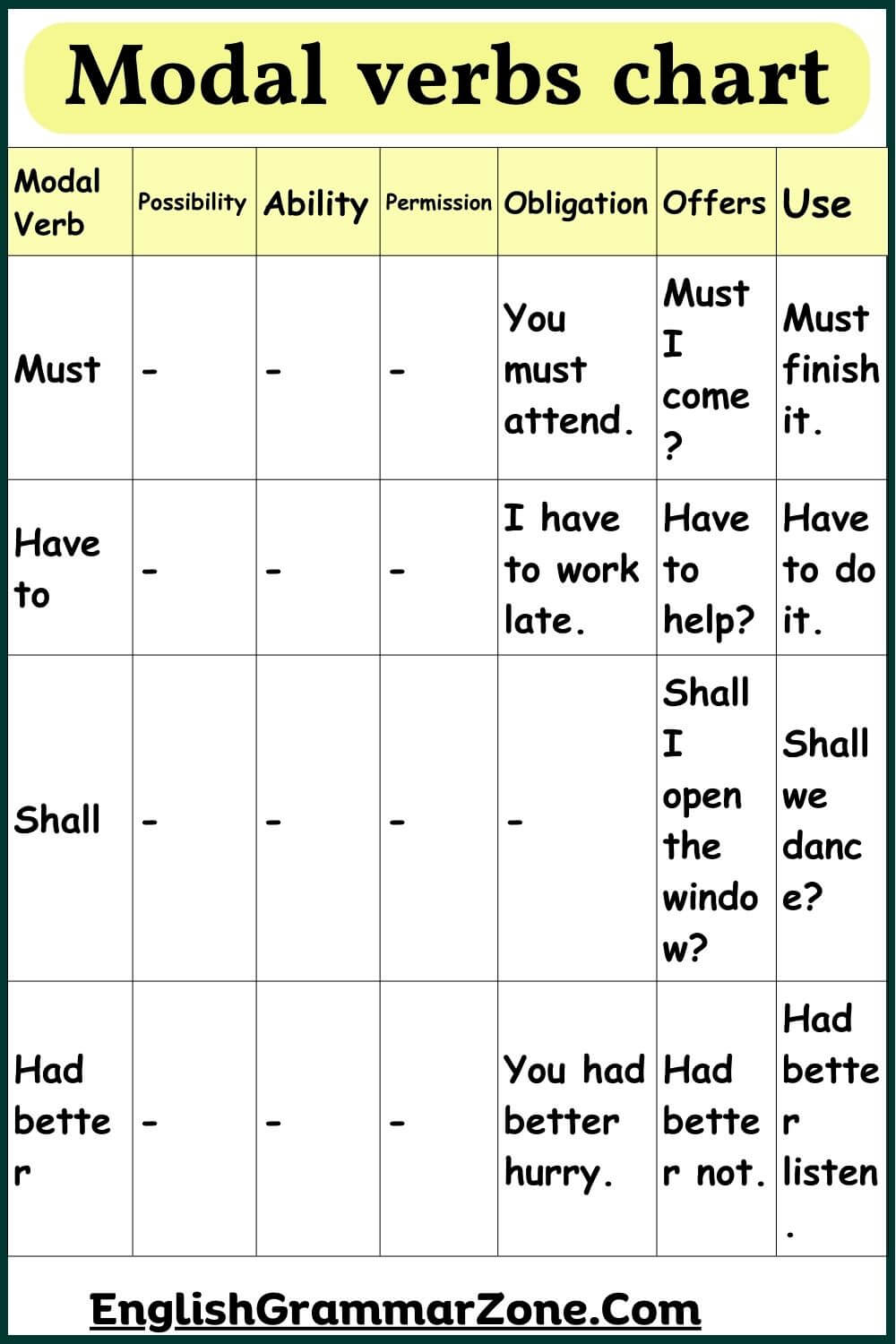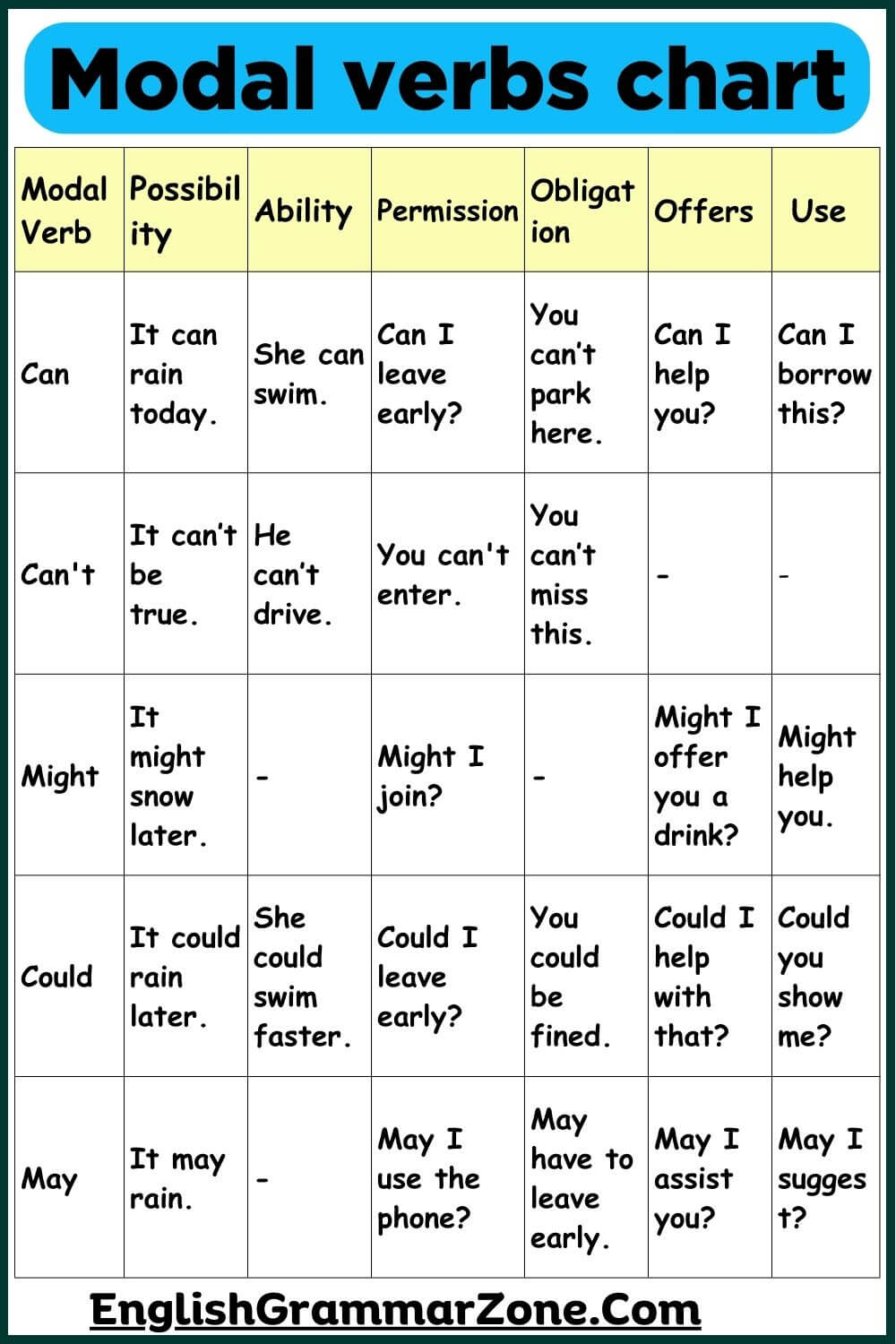Modal verbs chart
| Modal Verb | Possibility | Ability | Permission | Obligation | Offers | Use |
| Can | It can rain today. | She can swim. | Can I leave early? | You can’t park here. | Can I help you? | Can I borrow this? |
| Can’t | It can’t be true. | He can’t drive. | You can’t enter. | You can’t miss this. | – | – |
| Might | It might snow later. | – | Might I join? | – | Might I offer you a drink? | Might help you. |
| Could | It could rain later. | She could swim faster. | Could I leave early? | You could be fined. | Could I help with that? | Could you show me? |
| May | It may rain. | – | May I use the phone? | May have to leave early. | May I assist you? | May I suggest? |
| Must | – | – | – | You must attend. | Must I come? | Must finish it. |
| Have to | – | – | – | I have to work late. | Have to help? | Have to do it. |
| Shall | – | – | – | – | Shall I open the window? | Shall we dance? |
| Had better | – | – | – | You had better hurry. | Had better not. | Had better listen. |
Modal verb

Explanation:
- Possibility: Modal verbs like “can,” “might,” “could,” and “may” express whether something is possible.
- Ability: “Can” and “could” are used to talk about someone’s ability to do something.
- Permission: Modal verbs such as “can,” “may,” and “could” are used to ask for or give permission.
- Obligation: “Must,” “have to,” and “had better” express necessity or duty.
- Offers: “Can,” “might,” “could,” and “shall” are used to make offers.
| Modal Verb | Possibility | Ability | Permission | Obligation | Offers | Use |
| Can | It can get very cold here. | She can solve problems. | Can I use your laptop? | You can’t smoke here. | Can I help you with that? | Can you pass the salt? |
| Can’t | This can’t be the right answer. | He can’t lift that weight. | – | – | – | – |
| Might | We might go to the beach. | – | Might I see the manager? | – | Might I suggest a solution? | Might help if you try again. |
| Could | She could be at home. | He could play the piano. | Could I take a day off? | You could apologize. | Could I offer you a ride? | Could you explain that? |
| May | They may join us later. | – | May I have a drink? | May need to stay late. | May I offer you some tea? | May I come with you? |
| Must | – | – | – | You must complete the form. | Must I attend the meeting? | Must finish your homework. |
| Have to | – | – | – | I have to attend the seminar. | Have to pick up the kids? | Have to complete the task. |
| Shall | – | – | – | – | Shall I bring something? | Shall we start the project? |
| Had better | – | – | – | You had better not be late. | Had better come early. | Had better call them. |
Explanation:
- Possibility: “Can,” “might,” “could,” and “may” indicate the likelihood of an event.
- Ability: “Can” and “could” refer to skills or capabilities.
- Permission: “Can,” “may,” and “could” are used to ask for or grant permission.
- Obligation: “Must,” “have to,” and “had better” highlight necessity or duties.
- Offers: “Can,” “might,” “could,” and “shall” are used to make offers or suggestions.

Read More
1. List Of Possessive Pronoun With Example Worksheet

